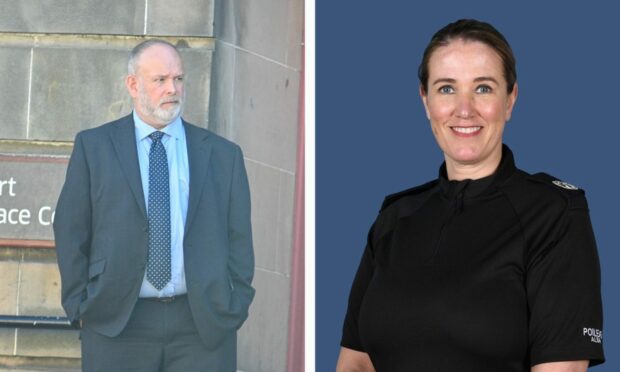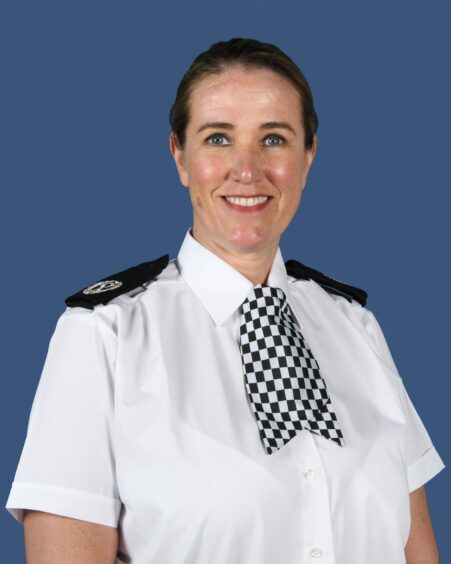The north’s police chief has spoken out against misogyny and sexual misconduct, following the conviction of a Moray police officer who sexually assaulted a female colleague.
Herbert Scott Gallop, now retired, was placed on the sex offenders register after an investigation into a toxic “boys’ club” culture at Forres police station.
But only 54-year-old Gallop, who’d touched his victim’s bottom and elsewhere after being told to stop, has been prosecuted – despite allegations against six other officers.
Assistant Chief Constable Emma Bond, the most senior officer responsible for policing across the north-east and Highlands and Islands, has welcomed Gallop’s conviction.
But she told the Press and Journal: “There may be no drawing of a line from a victim’s perspective, from what they’ve been through.
“The impact of that could be much longer lasting.”
ACC Bond said she hoped the outcome of the court case might give other potential victims “some degree of confidence” to “speak up”.
And the high-ranking official, who is Police Scotland’s executive lead for public confidence, also revealed: “We recognise that we’ve got issues.
“We’ve got people within the organisation who actually have carried out acts that could never be regarded as acceptable.
“It’s just simply not acceptable and I, alongside other colleagues, get exceptionally disappointed when the conduct of any of our members falls short of those professional standards that we expect.”
Allegations of bullying and misogyny at Forres police office were probed by the Police Investigations and Review Commissioner (PIRC) for 15 months from December 2018, at a cost of almost £250,000.
But the Crown Office said there was insufficient evidence of criminality in all but Gallop’s sexual assault case.
Sentencing the single father-of-one on November 10, a sheriff placed Gallop on the sex offenders register for one year and handed him a supervision order for the same length of time.
“It’s the minority of individuals that are engaged in this,” ACC Bond said, adding: “It does have an impact.
“The concern absolutely is that it would have a knock-on impact in terms of public trust and confidence.
“The vast majority of the people who join policing as a career, join up fully understanding the standards and requirements and the responsibilities that they carry.
“When any of us see reports or hear of reports of anybody being treated in a way that falls short of that, it disappoints us. It can make a lot of us very angry.”
‘Sex equality and tackling misogyny’
During the exclusive interview, in which she also spoke about women’s safety, the north region’s police chief insisted that the national force is “not complacent”.
“We’ve spoken very publicly around our commitment to tackling sex equality and misogyny to changing the culture,” she explained.
“We’ve got a lot of internal work ongoing in terms of sex equality and tackling misogyny.
“We’re very much aware that our internal culture potentially has an impact and bearing on how people perceive us externally and indeed how police officers and staff members engage and communicate with people.”
On November 2 this year, His Majesty’s Inspectorate of Constabulary and Fire & Rescue Services published a report entitled “An inspection of vetting, misconduct, and misogyny in the police service”.
The report, which applies to forces in England and Wales, was ordered by the UK Government Home Office after Metropolitan Police officer Wayne Couzens raped and murdered Sarah Everard, 33, in South London on March 3 last year.
It found “the majority of police officers and staff meet – and often exceed – the standards of behaviour the public have a right to expect”.
But an examination of police misconduct-related matters in the years prior to Sarah Everard’s murder revealed “some systemic failings, missed opportunities, and a generally inadequate approach to the setting and maintenance of standards in the police service”.
Misogynistic and predatory behaviour
Inspectors concluded that “a series of reports should have alerted forces that some of them were not properly equipped to prevent and investigate misogynistic and predatory behaviour.
“The police service has had ample warning that behaviours, cultures and processes need to change,” the report added.
Assistant Chief Constable Emma Bond was part of the inspection team that helped to develop the report, prior to joining Police Scotland.
She was asked if a similar inspection of Police Scotland was necessary for a report to reveal the true picture across the country.
‘We’ve got issues’
The ACC replied: “I’ll be really honest with you, I’m not convinced that we need to be inspected for a report.
“We recognise that we’ve got issues. We would never refuse or not wish to have an inspection.
“But Police Scotland is already looking at the recommendations within that report, what learning we can put in place – trying to be proactive.
“We’re not naive enough to, in any way, think that the issues that have been reported potentially aren’t happening here.”
For all the latest court cases in Aberdeen as well as crime and breaking incidents, join our Facebook group.



